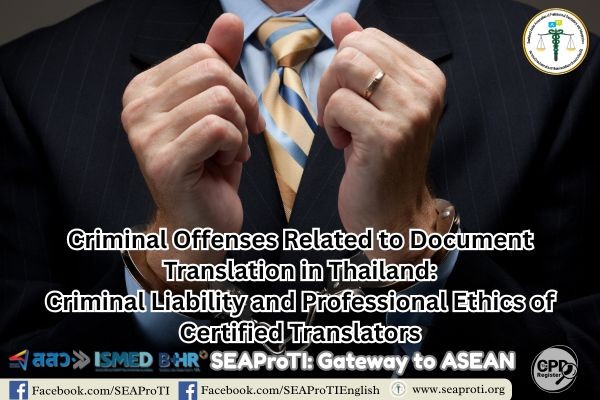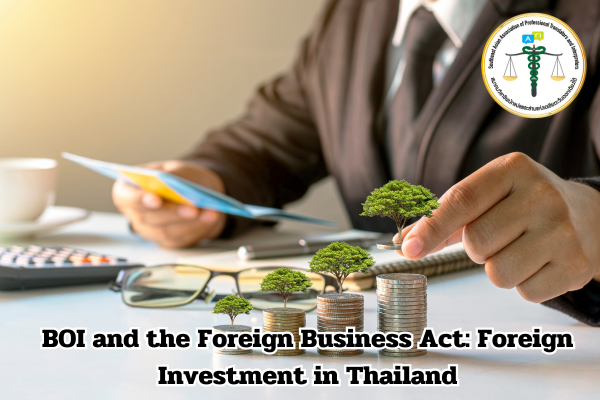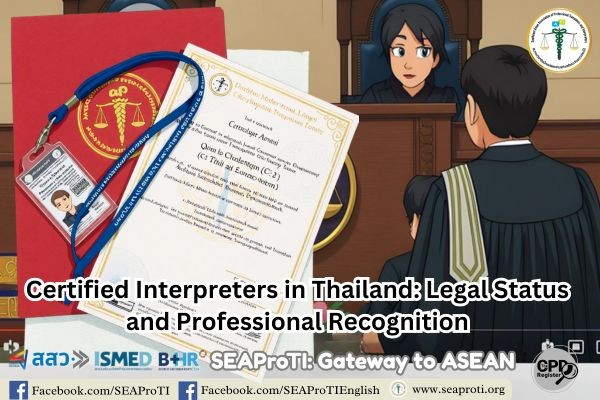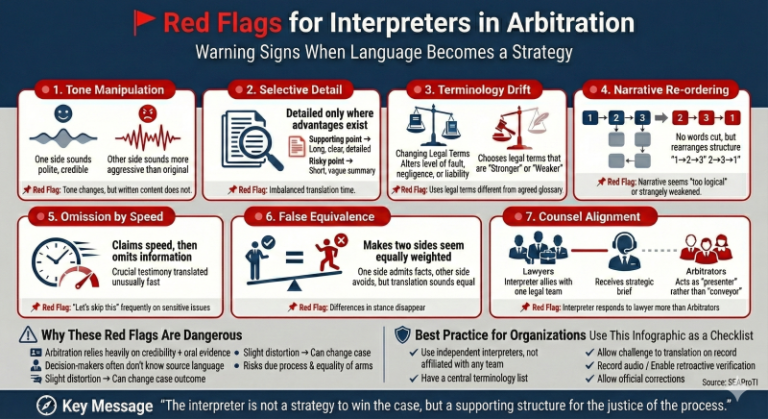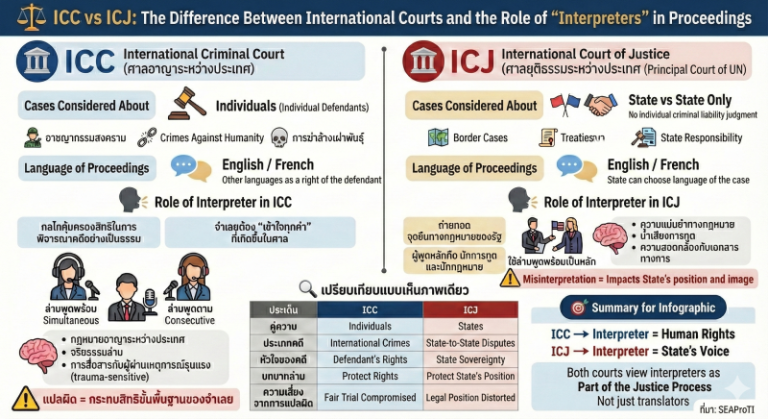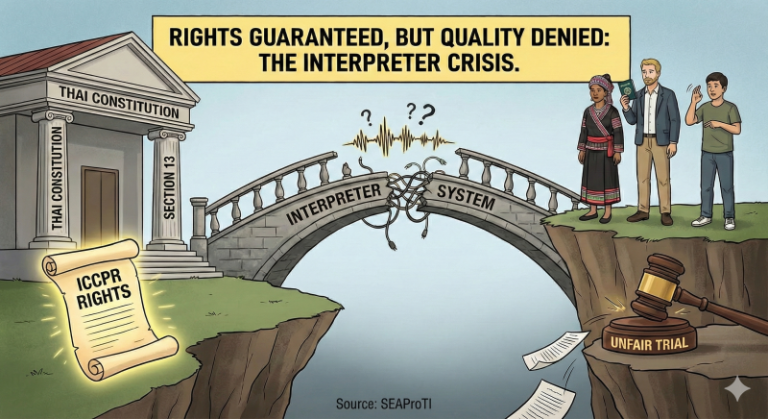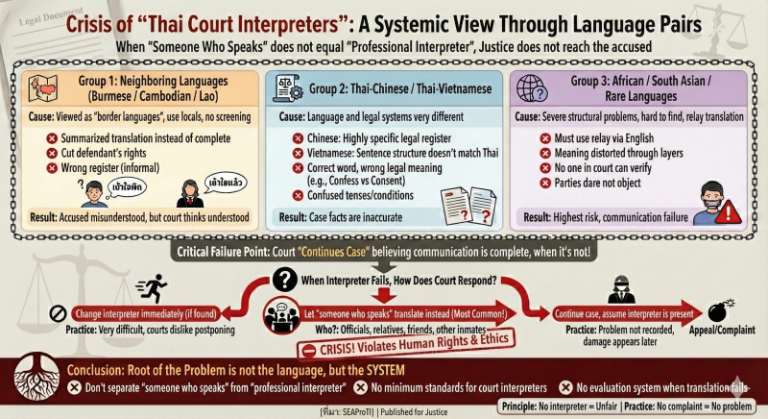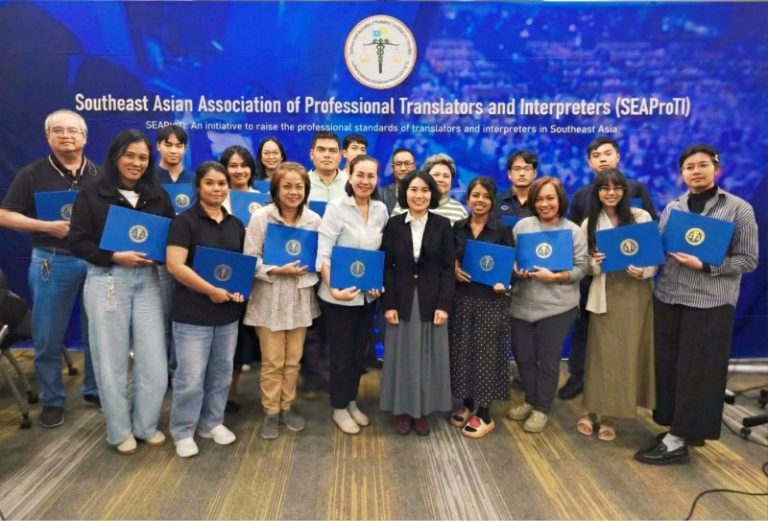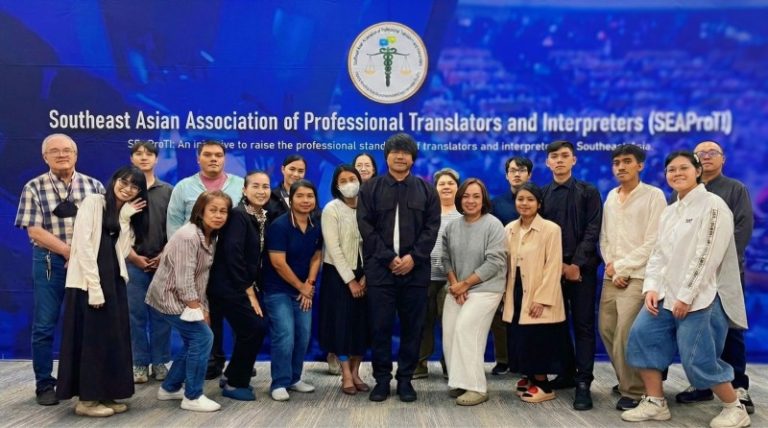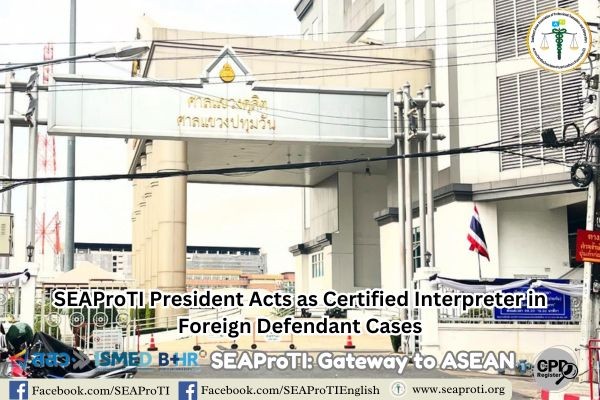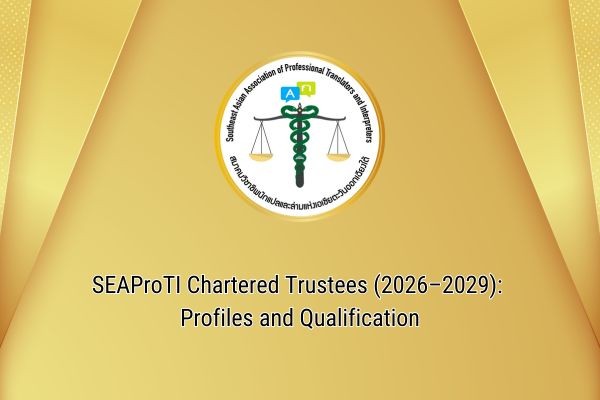Criminal Offenses Related to Document Translation in Thailand:
Criminal Liability and Professional Ethics of Certified Translators
16 October 2025, Bangkok – The translation of official, legal, financial, and medical documents directly affects individual rights, legal status, and obligations. Errors or falsifications in such translations can lead to serious legal consequences for both the client and the translator, particularly when the documents are used before courts, government agencies, or international institutions. Therefore, strong regulatory oversight and ethical frameworks are essential to prevent criminal activities within the field of document translation.
Document Forgery and Alteration
Falsifying or altering a translation to misrepresent a right, identity, or legal status constitutes forgery under Sections 264–269 of the Thai Penal Code, which prescribes imprisonment and fines for forged official or right-bearing documents (Office of the Council of State, 2024). Acts such as attaching a genuine translation to a falsified original or separating bound translation sets to replace pages are considered document tampering and may amount to forgery or use of a forged document. Thai courts treat such offenses as serious breaches of evidentiary integrity.
False Translation and Misrepresentation in Judicial Proceedings
Translators who knowingly render incorrect translations in documents submitted to courts or government agencies may be criminally liable for “false evidence” under Sections 177–178 of the Penal Code (Office of the Judiciary, 2023). Courts may order re-translation, summon the translator for testimony, or reject the translation as inadmissible evidence. Intentional falsification may escalate to charges akin to perjury or obstruction of justice, both of which carry severe penalties.
Unauthorized Certification of Translations
Individuals who falsely claim to be “certified translation providers” or “Notary Publics” without proper authorization engage in public misrepresentation, which can constitute criminal fraud or forgery of official documents (Ministry of Foreign Affairs, 2024). The Legalization Division of the Ministry of Foreign Affairs does not recognize translations that lack proper legalization, and any use of counterfeit seals or stamps from embassies or government authorities is treated as a criminal offense.
Anti-Forgery Measures and Safe Practices
Best practices dictate that the original and translated documents must be bound together with the translator’s signature or seal spanning across the binding to prevent page substitution or removal. Thai courts and administrative agencies emphasize procedural integrity, especially for foreign documents affecting property rights, personal status, or inheritance. Translations lacking complete legalization or certified seals from the Ministry of Foreign Affairs may be rejected as inadmissible evidence.
Civil and Professional Liability
Translators and interpreters also bear civil liability under the contract for work provisions of the Thai Civil and Commercial Code if their negligence or error causes damage to clients. Professional organizations such as the Southeast Asian Association of Professional Translators and Interpreters (SEAProTI) may impose disciplinary measures including suspension or revocation of certification in cases of misconduct or ethical violations.
Common Risk Scenarios
Frequent offenses include the use of counterfeit embassy or notarial seals, issuance of “certified translations” by unqualified individuals, and the attachment of translations to mismatched originals. Such acts not only violate criminal law but also undermine public confidence in the justice system and administrative integrity.
Recommended Practices for Institutions and Clients
To mitigate these risks, judicial, governmental, financial, and medical institutions abroad are strongly advised to entrust translation and certification tasks exclusively to licensed certified translators accredited by the Southeast Asian Association of Professional Translators and Interpreters (SEAProTI). SEAProTI’s Certified Translators and Translation Certification Providers are bound by a strict Code of Professional Ethics and are subject to oversight and disciplinary review.
If a certified translator or certification provider is found guilty of any of the aforementioned criminal offenses or ethical breaches, their professional license may be revoked, and they will be prohibited from performing translation or certification duties on behalf of the Association for ten (10) years. Only after this period may they reapply by undergoing training, re-examination, and peer certification (Peer Certification System) to regain professional standing.
Conclusion
Document translation in Thailand is not merely a linguistic task but a legally significant process requiring accuracy, transparency, and accountability. Offenses such as forgery, false translation, and unauthorized certification threaten the integrity of the justice system and public trust. Ensuring that translations are handled by licensed and certified professionals is therefore vital for maintaining the reliability of official documentation and protecting all parties involved.
References
- Ministry of Foreign Affairs. (2024). Guidelines on Translation Legalization and Detection of Forged Documents. Legalization Division.
- Office of the Council of State. (2024). Thai Penal Code (29th Amendment). Bangkok: Nititham Press.
- Office of the Judiciary. (2023). Guidelines for Using English Evidence and Document Translation in Court Proceedings. Bangkok: Office of the Judiciary.
- Southeast Asian Association of Professional Translators and Interpreters (SEAProTI). (2025). Code of Professional Ethics for Certified Translators and Interpreters. Bangkok: SEAProTI.
About Certified Translators, Translation Certifiers, and Certified Interpreters of SEAProTI
The Southeast Asian Association of Professional Translators and Interpreters (SEAProTI) has formally announced the qualifications and requirements for registration of Certified Translators, Translation Certification Providers, and Certified Interpreters in Sections 9 and 10 of the Royal Gazette, published by the Secretariat of the Cabinet, Office of the Prime Minister of Thailand, on 25 July 2024 (Vol. 141, Part 66 Ng, p. 100). Certified Translators, Translation Certification Providers, and Certified Interpreters
The Council of State has proposed the enactment of a Royal Decree, granting registered translators and recognized translation certifiers from professional associations or accredited language institutions the authority to provide legally valid translation certification (Letter to SEAProTI dated April 28, 2025)
SEAProTI is the first professional association in Thailand and Southeast Asia to implement a comprehensive certification system for translators, certifiers, and interpreters.
Head Office: Baan Ratchakru Building, No. 33, Room 402, Soi Phahonyothin 5, Phahonyothin Road, Phaya Thai District, Bangkok 10400, Thailand
Email: hello@seaproti.com | Tel.: (+66) 2-114-3128 (Office hours: Mon–Fri, 09:00–17:00)
อาชญากรรมที่เกี่ยวข้องกับการแปลเอกสารในประเทศไทย:
ความรับผิดทางอาญาและจรรยาบรรณวิชาชีพของนักแปลรับรอง
16 ตุลาคม 2568, กรุงเทพมหานคร – การแปลเอกสารทางราชการ กฎหมาย การเงิน หรือการแพทย์ เป็นกระบวนการที่เกี่ยวพันโดยตรงกับสิทธิ หน้าที่ และสถานะทางกฎหมายของบุคคล การแปลผิดหรือการปลอมแปลงเอกสารอาจก่อให้เกิดผลทางกฎหมายร้ายแรง ทั้งต่อผู้ใช้เอกสารและผู้แปล โดยเฉพาะเมื่อมีการใช้เอกสารดังกล่าวต่อหน่วยงานรัฐ ศาล หรือองค์กรระหว่างประเทศ ดังนั้น จึงจำเป็นต้องมีระบบกำกับดูแลและจรรยาบรรณวิชาชีพเพื่อป้องกันอาชญากรรมที่อาจเกิดขึ้นในวงการแปลเอกสาร
การปลอมแปลงและการแก้ไขเอกสาร
การปลอมแปลงเอกสารแปลหรือแก้ไขข้อความเพื่อแสดงสิทธิ์หรือสถานะที่ไม่เป็นจริง ถือเป็นความผิดตาม ประมวลกฎหมายอาญา มาตรา 264–269 ซึ่งกำหนดโทษจำคุกและปรับในกรณีที่เป็นการปลอมแปลงเอกสารสิทธิหรือเอกสารราชการ (สำนักงานคณะกรรมการกฤษฎีกา, 2567) การกระทำเช่นการแนบคำแปลจริงกับต้นฉบับปลอมหรือการแยกเอกสารแปลที่ผนึกไว้เพื่อสับเปลี่ยนหน้าเอกสาร ถือเป็นการดัดแปลงซึ่งอาจเข้าข่ายความผิดฐานใช้เอกสารปลอม ศาลไทยมักถือว่าความผิดลักษณะนี้เป็นการบ่อนทำลายความน่าเชื่อถือของกระบวนการยุติธรรม
การแปลเท็จและการให้ข้อมูลอันเป็นเท็จต่อศาล
ผู้แปลที่แปลข้อความโดยรู้อยู่แล้วว่าไม่ถูกต้อง หรือบิดเบือนความหมายในเอกสารที่ใช้เป็นพยานหลักฐานในศาลหรือหน่วยงานรัฐ อาจเข้าข่ายความผิดฐาน “ให้ถ้อยคำอันเป็นเท็จ” ตาม ประมวลกฎหมายอาญา มาตรา 177–178 (สำนักงานศาลยุติธรรม, 2566) ศาลอาจสั่งให้แปลใหม่หรือเรียกผู้แปลมาให้การ หากพิสูจน์ได้ว่าเป็นการแปลเท็จโดยเจตนา ความผิดอาจถูกพิจารณาในลักษณะของ “การให้การเท็จ” หรือ “ขัดขวางกระบวนการยุติธรรม” ซึ่งมีโทษร้ายแรง
การรับรองเอกสารโดยไม่ได้รับอนุญาต
บุคคลที่อ้างตนว่าเป็น “ผู้รับรองการแปล” หรือ “Notary Public” ทั้งที่ไม่มีคุณสมบัติหรือไม่ได้รับแต่งตั้งจากหน่วยงานที่เกี่ยวข้อง ถือเป็นการแสดงข้อความอันเป็นเท็จต่อสาธารณะ ซึ่งอาจถูกดำเนินคดีฐาน “ฉ้อโกง” หรือ “ปลอมแปลงเอกสารราชการ” ได้ (กระทรวงการต่างประเทศ, 2567) ทั้งนี้ กรมการกงสุลมักไม่รับรองเอกสารแปลที่ไม่ได้ผ่านกระบวนการรับรองถูกต้อง หากตรวจพบตราประทับหรือเอกสารปลอม จะถูกส่งดำเนินคดีอาญาทันที
มาตรการป้องกันการปลอมแปลงและแนวปฏิบัติที่ปลอดภัย
แนวทางปฏิบัติที่ถูกต้องคือ การผนึกต้นฉบับกับคำแปลไว้ในชุดเดียวกัน โดยลงนามหรือประทับตราคาบระหว่างหน้าเอกสาร เพื่อป้องกันการสับเปลี่ยนหรือแยกชุด ศาลไทยและหน่วยงานราชการให้ความสำคัญกับความครบถ้วนของเอกสาร โดยเฉพาะเอกสารต่างประเทศที่มีผลต่อสิทธิในทรัพย์สิน สถานภาพบุคคล หรือมรดก หากไม่มีตรารับรองของกระทรวงการต่างประเทศหรือคำแปลไม่ครบถ้วน อาจถูกปฏิเสธไม่รับเป็นหลักฐาน
ความรับผิดทางแพ่งและทางวิชาชีพ
นักแปลและล่ามยังอาจต้องรับผิดทางแพ่งตามหลัก สัญญาจ้างทำของ ตามประมวลกฎหมายแพ่งและพาณิชย์ หากการแปลผิดทำให้ผู้ว่าจ้างเกิดความเสียหาย นอกจากนี้ องค์กรวิชาชีพ เช่น สมาคมวิชาชีพนักแปลและล่ามแห่งเอเชียตะวันออกเฉียงใต้ (SEAProTI) อาจดำเนินการทางวินัย เช่น การเพิกถอนการรับรอง หรือพักใช้ใบอนุญาตในกรณีที่มีพฤติกรรมขัดต่อจรรยาบรรณ
ความเสี่ยงและสถานการณ์ที่พบบ่อย
กรณีที่พบบ่อย ได้แก่ การใช้ตราประทับปลอมของสถานทูตหรือ Notary Public, การออกใบรับรองการแปลโดยผู้ที่ไม่มีสิทธิ์ตามกฎหมาย และการใช้คำแปลแนบกับต้นฉบับที่ไม่ตรงกัน การกระทำเหล่านี้ไม่เพียงแต่มีผลทางกฎหมาย แต่ยังบ่อนทำลายความเชื่อมั่นของหน่วยงานในระบบราชการและกระบวนการยุติธรรม
แนวทางที่เหมาะสมสำหรับหน่วยงานและผู้ใช้บริการ
เพื่อป้องกันความเสียหาย หน่วยงานในกระบวนการยุติธรรม หน่วยงานราชการ ธนาคาร และองค์กรด้านการแพทย์ในต่างประเทศ ควรมอบหมายให้เฉพาะ นักแปลรับรองที่มีใบอนุญาต (Licensed Certified Translators) จาก สมาคมวิชาชีพนักแปลและล่ามแห่งเอเชียตะวันออกเฉียงใต้ (SEAProTI) เป็นผู้แปลและรับรองเอกสาร เนื่องจากนักแปลรับรอง (Certified Translators) และผู้รับรองการแปล (Translation Certification Providers) ของสมาคมมีข้อผูกพันต้องปฏิบัติตาม จรรยาบรรณวิชาชีพอย่างเคร่งครัด และอยู่ภายใต้ระบบตรวจสอบอย่างเป็นทางการ
หากพบว่ามีการกระทำผิดตามกฎหมายอาญาหรือฝ่าฝืนจรรยาบรรณ นักแปลรับรองหรือผู้รับรองการแปลของสมาคมอาจถูกเพิกถอนใบอนุญาตและ ห้ามประกอบวิชาชีพในนามสมาคมเป็นระยะเวลา 10 ปี ก่อนที่จะสามารถกลับเข้าสู่ระบบการอบรม สอบ และผ่านกระบวนการ การรับรองโดยผู้ที่มีความรู้เสมอกัน (Peer Certification System) ได้อีกครั้ง
บทสรุป
การแปลเอกสารในประเทศไทยไม่ใช่เพียงการถ่ายทอดภาษา แต่เป็นกระบวนการทางกฎหมายที่ต้องรักษาความถูกต้อง ความโปร่งใส และความรับผิดชอบอย่างสูง อาชญากรรมที่เกี่ยวข้องกับการแปล เช่น การปลอมแปลง การแปลเท็จ หรือการรับรองโดยไม่ได้รับอนุญาต เป็นภัยต่อทั้งระบบยุติธรรมและความเชื่อมั่นของสังคม การเลือกใช้บริการนักแปลรับรองที่มีใบอนุญาตจึงเป็นแนวทางสำคัญในการป้องกันความเสียหายและคุ้มครองสิทธิของผู้เกี่ยวข้อง
เอกสารอ้างอิง (References)
- กระทรวงการต่างประเทศ. (2567). แนวทางการรับรองเอกสารแปลและการตรวจสอบเอกสารปลอม. กรมการกงสุล.
- สำนักงานคณะกรรมการกฤษฎีกา. (2567). ประมวลกฎหมายอาญา แก้ไขเพิ่มเติม (ฉบับที่ 29). กรุงเทพฯ: สำนักพิมพ์นิติธรรม.
- สำนักงานศาลยุติธรรม. (2566). คู่มือแนวทางการใช้พยานหลักฐานภาษาอังกฤษและการแปลเอกสารในกระบวนการศาล. กรุงเทพฯ: สำนักงานศาลยุติธรรม.
- สมาคมวิชาชีพนักแปลและล่ามแห่งเอเชียตะวันออกเฉียงใต้ (SEAProTI). (2568). จรรยาบรรณวิชาชีพนักแปลและล่ามรับรอง. กรุงเทพฯ: SEAProTI.
เกี่ยวกับนักแปลรับรอง ผู้รับรองการแปล และล่ามรับรองของสมาคมวิชาชีพนักแปลและล่ามแห่งเอเชียตะวันออกเฉียงใต้
สมาคมวิชาชีพนักแปลและล่ามแห่งเอเชียตะวันออกเฉียงใต้ (SEAProTI) ได้ประกาศหลักเกณฑ์และคุณสมบัติผู้ที่ขึ้นทะเบียนเป็น “นักแปลรับรอง (Certified Translators) และผู้รับรองการแปล (Translation Certification Providers) และล่ามรับรอง (Certified Interpreters)” ของสมาคม หมวดที่ 9 และหมวดที่ 10 ในราชกิจจานุเบกษา ของสำนักเลขาธิการคณะรัฐมนตรี ในสำนักนายกรัฐมนตรี แห่งราชอาณาจักรไทย ลงวันที่ 25 ก.ค. 2567 เล่มที่ 141 ตอนที่ 66 ง หน้า 100 อ่านฉบับเต็มได้ที่: นักแปลรับรอง ผู้รับรองการแปล และล่ามรับรอง
สำนักคณะกรรมการกฤษฎีกาเสนอให้ตราเป็นพระราชกฤษฎีกา โดยกำหนดให้นักแปลที่ขึ้นทะเบียน รวมถึงผู้รับรองการแปลจากสมาคมวิชาชีพหรือสถาบันสอนภาษาที่มีการอบรมและขึ้นทะเบียน สามารถรับรองคำแปลได้ (จดหมายถึงสมาคม SEAProTI ลงวันที่ 28 เม.ย. 2568)
สมาคมวิชาชีพนักแปลและล่ามแห่งเอเชียตะวันออกเฉียงใต้ เป็นสมาคมวิชาชีพแห่งแรกในประเทศไทยและภูมิภาคเอเชียตะวันออกเฉียงใต้ที่มีระบบรับรองนักแปลรับรอง ผู้รับรองการแปล และล่ามรับรอง
สำนักงานใหญ่: อาคารบ้านราชครู เลขที่ 33 ห้อง 402 ซอยพหลโยธิน 5 ถนนพหลโยธิน แขวงพญาไท เขตพญาไท กรุงเทพมหานคร 10400 ประเทศไทย
อีเมล: hello@seaproti.com โทรศัพท์: (+66) 2-114-3128 (เวลาทำการ: วันจันทร์–วันศุกร์ เวลา 09.00–17.00 น.)


